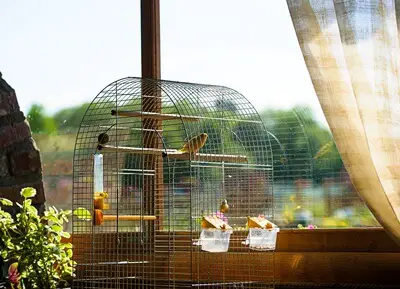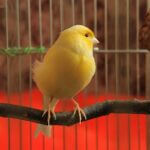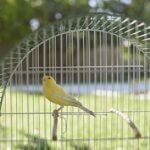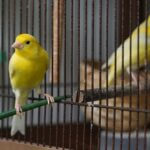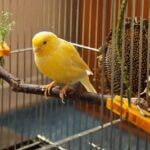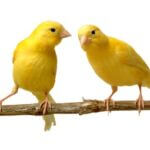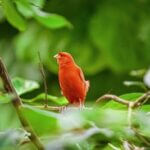Many owners turn to mirrors to keep their canaries company, which can make them believe that a second bird is sharing the cage.
Despite the popularity of mirrors, many owners still wonder if tricking their canary with an imaginary friend is a good or bad idea.
Do Canaries Like Mirrors in Their Cage?
Some canaries like mirrors in their cages because they see the reflection as another friendly canary. Then, they’ll spend all day conversing with the other bird in their presence.
Canaries love to hear themselves sing, especially in front of other birds. A mirror can keep a canary entertained for hours.
Other canaries, especially males, may feel threatened by what they see. They don’t understand that it’s their own reflection and think it’s another bird they need to compete with for resources.
If your canary doesn’t like mirrors, it’ll feel stressed and annoyed over the invasion of its space.
Do Canaries Need Mirrors in Their Cages?
Canaries don’t strictly need mirrors in their cages. You can raise and care for a canary without ever putting a mirror in its cage.
Many people think that canaries need mirrors because they’ll get lonely. However, canaries are solitary birds that don’t need the company of another bird to be happy.
Wild canaries rarely live in flocks. They’ll occasionally come together to forage and mate, but they spend most of their time alone. The idea that it’s cruel to trick a canary into interacting with an imaginary bird comes from how some parrots behave with mirrors.
Certain parrot species are smarter and more sociable than canaries, so a one-sided conversation with their reflection will depress the parrot. Canaries aren’t wired to desire deep bonds.
A canary in a good home won’t die of loneliness, so you don’t need to get a mirror if you already give it all the care and attention it needs to thrive.
Is It a Good Idea to Give a Canary a Mirror?
Whether it’s a good idea to give your canary a mirror will depend on the individual bird. Before you buy a mirror, you should consider the advantages and disadvantages.
Not all canaries will benefit from having a mirror in the cage. So, you need to take the right steps to ensure that getting a mirror is the right choice for your canary.
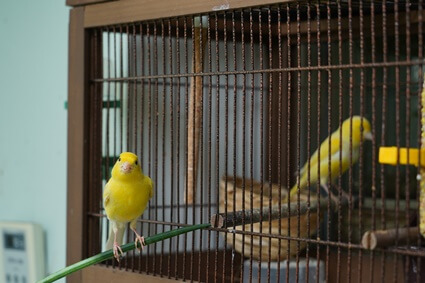
Advantages of Giving a Canary a Mirror
If your canary happens to love the mirror, it’ll benefit its life greatly by:
- Being a source of entertainment
- Getting the canary to sing more
Although canaries aren’t demanding birds, they require a certain amount of mental stimulation.
If you go to work and can only spend time with your canary late in the evening, you may benefit from a mirror. Preventing boredom is important because it prevents stress, and a mentally stimulated canary is healthier.
Canaries also sing more when they’re around other canaries, and a mirror can help. This isn’t always guaranteed because it depends on what the canary thinks of its reflection.
Although a canary may not understand that it’s staring at itself in the mirror, it’s unknown if the canary can tell if the fake bird is male or female.
Canaries can see ultraviolet light. Ultraviolet light affects a canary’s plumage differently, depending on whether it’s male or female, even if the plumage looks the same to us.
That’s how they differentiate between different canaries and choose mates. It isn’t known if they can see the ultraviolet light in the mirror and tell which gender the bird in the mirror is.
If they can, a male canary might feel threatened by a rival male when looking in the mirror. If they can’t, the canary will see the fake bird as a friend and sing often.
If your canary sings less after getting the mirror, it could be because it sees the reflection as female. According to the European Journal of Neuroscience, male canaries sing less when paired with a female.
This seems unusual because male canaries primarily sing to attract females.
Disadvantages of Giving a Canary a Mirror
Some disadvantages come from giving a canary a mirror. The canary might:
- Get aggressive
- Injure itself
- Get stressed
These negatives are possible if the canary dislikes the mirror and sees its reflection as a threat.
If you keep the mirror inside the cage and the canary tries to attack it, it might injure itself against the solid surface of the glass. However, this can be avoided by placing the mirror outside of the cage.
How To Tell if Your Canary Doesn’t Like Its Mirror
Before giving your canary a mirror, you must monitor its behavior for a few days. You need to see if the canary likes or dislikes the mirror immediately.
Never place the mirror in the cage and leave the bird alone for hours. If your canary doesn’t like it, it’ll spend hours alone and stressed with what it believes is a strange new bird in its space.
If you want to understand how your canary feels about the mirror, you need to understand canary body language and vocalization. When a male canary feels threatened by another bird, it’ll squeak at it.
Squeaking is a short, high-pitched whistling sound that canaries make when fighting. They open their beaks wide, lean forward, and hop around while squeaking to intimidate the enemy bird. Some canaries may even charge and peck at the mirror if they want to bully the reflection into submission.
As for body language, your canary may suddenly become timid or aggressive. It may bite you for no reason or refuse to get close to you. It may feel like it isn’t welcome in its cage anymore and hide away in a corner instead of jumping from perch to perch.
Long-term stress can lead to health problems like:
- Loss of appetite
- Less vocalization
- Feather picking
If you notice these negative changes, remove the mirror. After your canary’s introduced to the mirror, you should monitor its behavior.
Certain environmental factors can change a canary’s hormones and mood, causing them to suddenly dislike the mirror. For example, when female canaries are nesting, they become more territorial and aggressive toward anyone who gets close to the nest.

